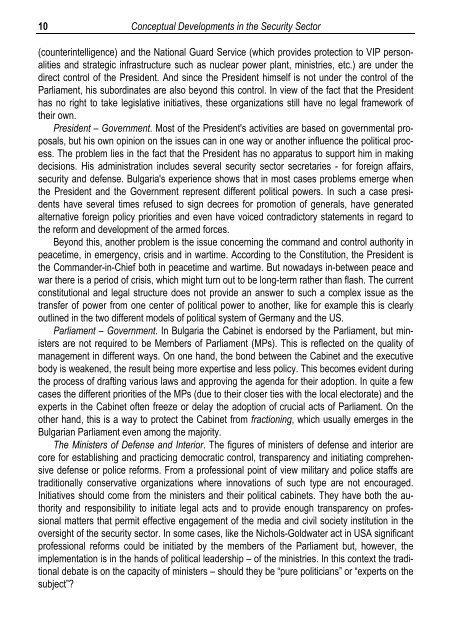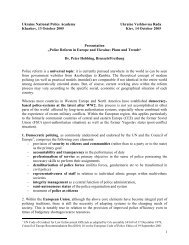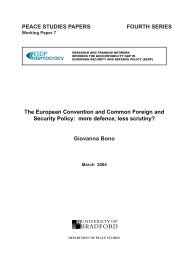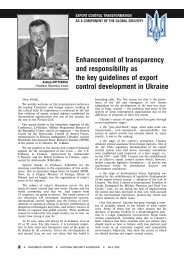Civil-Military Relations and Democratic Control of the Security Sector
Civil-Military Relations and Democratic Control of the Security Sector
Civil-Military Relations and Democratic Control of the Security Sector
You also want an ePaper? Increase the reach of your titles
YUMPU automatically turns print PDFs into web optimized ePapers that Google loves.
10<br />
Conceptual Developments in <strong>the</strong> <strong>Security</strong> <strong>Sector</strong><br />
(counterintelligence) <strong>and</strong> <strong>the</strong> National Guard Service (which provides protection to VIP personalities<br />
<strong>and</strong> strategic infrastructure such as nuclear power plant, ministries, etc.) are under <strong>the</strong><br />
direct control <strong>of</strong> <strong>the</strong> President. And since <strong>the</strong> President himself is not under <strong>the</strong> control <strong>of</strong> <strong>the</strong><br />
Parliament, his subordinates are also beyond this control. In view <strong>of</strong> <strong>the</strong> fact that <strong>the</strong> President<br />
has no right to take legislative initiatives, <strong>the</strong>se organizations still have no legal framework <strong>of</strong><br />
<strong>the</strong>ir own.<br />
President – Government. Most <strong>of</strong> <strong>the</strong> President's activities are based on governmental proposals,<br />
but his own opinion on <strong>the</strong> issues can in one way or ano<strong>the</strong>r influence <strong>the</strong> political process.<br />
The problem lies in <strong>the</strong> fact that <strong>the</strong> President has no apparatus to support him in making<br />
decisions. His administration includes several security sector secretaries - for foreign affairs,<br />
security <strong>and</strong> defense. Bulgaria's experience shows that in most cases problems emerge when<br />
<strong>the</strong> President <strong>and</strong> <strong>the</strong> Government represent different political powers. In such a case presidents<br />
have several times refused to sign decrees for promotion <strong>of</strong> generals, have generated<br />
alternative foreign policy priorities <strong>and</strong> even have voiced contradictory statements in regard to<br />
<strong>the</strong> reform <strong>and</strong> development <strong>of</strong> <strong>the</strong> armed forces.<br />
Beyond this, ano<strong>the</strong>r problem is <strong>the</strong> issue concerning <strong>the</strong> comm<strong>and</strong> <strong>and</strong> control authority in<br />
peacetime, in emergency, crisis <strong>and</strong> in wartime. According to <strong>the</strong> Constitution, <strong>the</strong> President is<br />
<strong>the</strong> Comm<strong>and</strong>er-in-Chief both in peacetime <strong>and</strong> wartime. But nowadays in-between peace <strong>and</strong><br />
war <strong>the</strong>re is a period <strong>of</strong> crisis, which might turn out to be long-term ra<strong>the</strong>r than flash. The current<br />
constitutional <strong>and</strong> legal structure does not provide an answer to such a complex issue as <strong>the</strong><br />
transfer <strong>of</strong> power from one center <strong>of</strong> political power to ano<strong>the</strong>r, like for example this is clearly<br />
outlined in <strong>the</strong> two different models <strong>of</strong> political system <strong>of</strong> Germany <strong>and</strong> <strong>the</strong> US.<br />
Parliament – Government. In Bulgaria <strong>the</strong> Cabinet is endorsed by <strong>the</strong> Parliament, but ministers<br />
are not required to be Members <strong>of</strong> Parliament (MPs). This is reflected on <strong>the</strong> quality <strong>of</strong><br />
management in different ways. On one h<strong>and</strong>, <strong>the</strong> bond between <strong>the</strong> Cabinet <strong>and</strong> <strong>the</strong> executive<br />
body is weakened, <strong>the</strong> result being more expertise <strong>and</strong> less policy. This becomes evident during<br />
<strong>the</strong> process <strong>of</strong> drafting various laws <strong>and</strong> approving <strong>the</strong> agenda for <strong>the</strong>ir adoption. In quite a few<br />
cases <strong>the</strong> different priorities <strong>of</strong> <strong>the</strong> MPs (due to <strong>the</strong>ir closer ties with <strong>the</strong> local electorate) <strong>and</strong> <strong>the</strong><br />
experts in <strong>the</strong> Cabinet <strong>of</strong>ten freeze or delay <strong>the</strong> adoption <strong>of</strong> crucial acts <strong>of</strong> Parliament. On <strong>the</strong><br />
o<strong>the</strong>r h<strong>and</strong>, this is a way to protect <strong>the</strong> Cabinet from fractioning, which usually emerges in <strong>the</strong><br />
Bulgarian Parliament even among <strong>the</strong> majority.<br />
The Ministers <strong>of</strong> Defense <strong>and</strong> Interior. The figures <strong>of</strong> ministers <strong>of</strong> defense <strong>and</strong> interior are<br />
core for establishing <strong>and</strong> practicing democratic control, transparency <strong>and</strong> initiating comprehensive<br />
defense or police reforms. From a pr<strong>of</strong>essional point <strong>of</strong> view military <strong>and</strong> police staffs are<br />
traditionally conservative organizations where innovations <strong>of</strong> such type are not encouraged.<br />
Initiatives should come from <strong>the</strong> ministers <strong>and</strong> <strong>the</strong>ir political cabinets. They have both <strong>the</strong> authority<br />
<strong>and</strong> responsibility to initiate legal acts <strong>and</strong> to provide enough transparency on pr<strong>of</strong>essional<br />
matters that permit effective engagement <strong>of</strong> <strong>the</strong> media <strong>and</strong> civil society institution in <strong>the</strong><br />
oversight <strong>of</strong> <strong>the</strong> security sector. In some cases, like <strong>the</strong> Nichols-Goldwater act in USA significant<br />
pr<strong>of</strong>essional reforms could be initiated by <strong>the</strong> members <strong>of</strong> <strong>the</strong> Parliament but, however, <strong>the</strong><br />
implementation is in <strong>the</strong> h<strong>and</strong>s <strong>of</strong> political leadership – <strong>of</strong> <strong>the</strong> ministries. In this context <strong>the</strong> traditional<br />
debate is on <strong>the</strong> capacity <strong>of</strong> ministers – should <strong>the</strong>y be “pure politicians” or “experts on <strong>the</strong><br />
subject”?

















